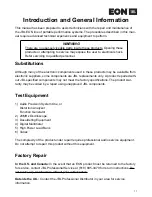
20
+/– 77V Supply Test
The low frequency power amp might also be pulling excessive current. Check for correct
value of R4 and R6 (3.3K) and verify 1.5VDC across them when board is powered. Check
for correct value of R5, R9, R21 and R29 (243 ohms) and verify 900mVDC across them
when board is powered. Check for correct value of R18 (100 ohms) and verify 1.1VDC
across it when board is powered. If any of the above is not true proceed to “Low Fre-
quency Power Amp Test”.
G) Amplifier Muting Test
Power up board and measure voltage at junction of D12, R33 and C21. The voltage
should be –35VDC with about 10V of ripple. If voltage is positive check polarity of D12. If
ripple is excessive check values of R33, C21 and R34.
Measure base of Q17. Voltage should be –.6V. If voltage is more than –1V then
D13 is open or reversed biased. The collector of Q17 should be at 9V.
Turn power off. Q17 base should quickly go to .6V. If less, check R48 value and for
shorted Q17 (base emitter). If greater than .6V check for open Q17 from base to emitter.
Power up board while monitoring collector of Q17. Voltage should ramp from zero to
around 9V in around 2 seconds. If collector remains close to zero check for:
1.
collector to emitter short on Q17
2.
incorrect value R49
3.
shorted TS1 (Thermostat should be open when cold and will close at 80 degrees C)
4.
reversed or shorted Z2.
If voltage ramps up higher than 10V check for open or incorrect value Z2, and for an open
Q16 from base to emitter.
Interrupt power while monitoring collector of Q17. The voltage should quickly fall close to
zero volts. If it doesn’t replace open (from collector to emitter) Q17.
Voltage from base to emitter on Q16 should be .6VDC, if less than that, check for proper
value of R36 and from base to emitter short on Q16.
With power applied the collector of Q16 should be close to –15V. After removing power
the collector should go high, if this is not the case check R35, R44, R47 and Q16.
With power applied the collector of Q16 will be at –15V. This will turn on Q15 and bring the
collector of Q15 close to ground. The voltage at the base of Q15 should be around –.6V. If
lower check value of R35 and verify Q15 and D14 are not shorted. After removing power,
base of Q15 should go to around .6V. If greater than .6V replace open D14.
When operating normal the collector of Q15 should be close to ground potential. If not
check R32. If R32 is correct replace open Q15. When power is removed the collector ofQ15
should approach –15V. If collector stays close to ground potential look for short sur
Содержание EON15
Страница 23: ...High Frequency Response EON Power15 and EON15P 1 230 33...
Страница 24: ...Low Frequency Response EON Power15 and EON15P 1 230 34...
Страница 30: ...Low Frequency Response EON PowerSub 40...
Страница 35: ...High Frequency Response EON Power10 45...
Страница 36: ...Low Frequency Response EON Power10 46...











































